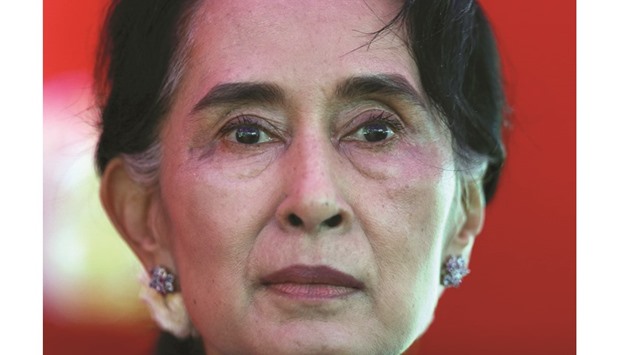Myanmar’s deposed civilian leader Aung San Suu Kyi was hit with another charge yesterday, after the military imposed a second straight overnight Internet shutdown in an attempt to grind down an anti-coup uprising.
In the two weeks since the generals ousted Suu Kyi and put her under house arrest in the administrative capital Naypyidaw, big cities and isolated village communities alike have been in open revolt.
The military justified its power seizure by alleging widespread voter fraud in November elections won by Suu Kyi’s party.
After her detention in a dawn raid on February 1 — the day of the coup — she was charged under an obscure import and export law, over walkie talkies that were found in her home during a search.
The Nobel laureate’s lawyer said yesterday she had been hit with a second charge, of violating the country’s disaster management law.
“She was charged under section 8 of the Export and Import law and section 25 of the Natural Disaster Management law as well,” Khin Maung Zaw said.
While it was unclear how the disaster law applied in Suu Kyi’s case, it has been used against deposed president Win Myint — also arrested on February 1 — relating to a campaign event that the junta alleges broke coronavirus-related restrictions.
Khin Maung Zaw added that Suu Kyi and Win Myint, both of whom he has yet to have any contact with, were expected to appear via video conference during a March 1 trial.
Both defendants were in a “safer place” and “in good health”, according to military spokesman Zaw Min Tun.
“It’s not like they were arrested — they are staying at their houses,” the general, who became the country’s vice-minister of information after the coup, told a press conference yesterday.
But British Foreign Secretary Dominic Raab blasted the charges, and reiterated a call to release Suu Kyi and other detained politicians.
“The charges against Aung San Suu Kyi are politically motivated,” he said in a statement, warning, “We will ensure those responsible are held to account”.
More than 420 people have been arrested since the coup, according to a list of confirmed detentions from the Assistance Association for Political Prisoners monitoring group.
Security forces have used increasing force to quell huge nationwide street protests and a disobedience campaign encouraging civil servants to strike.
Troops have fanned out around the country in recent days.
Rubber bullets, tear gas and even sling shots have been used against protesters, and one demonstration in Mandalay on Monday saw police beating journalists hours before authorities again cut Internet access.
“They shut down the Internet because they want to do bad things,” said 44-year-old Win Tun, who lives in the commercial capital Yangon.
“We didn’t sleep the whole night so we could see what would happen.”
Undeterred, crowds returned to the streets of Yangon and around the country yesterday morning.
“I want more people to join the protests, we don’t want to be seen as weak,” said university student Thwe Ei Sann.
A large crowd blocked railway tracks outside Mawlamyine to prevent a Yangon-bound train from leaving the port city.
Many of the country’s train drivers have joined the anti-coup work boycotts, frustrating junta efforts to restart the national railway network after a Covid-19 shutdown.

Aung San Suu Kyi
